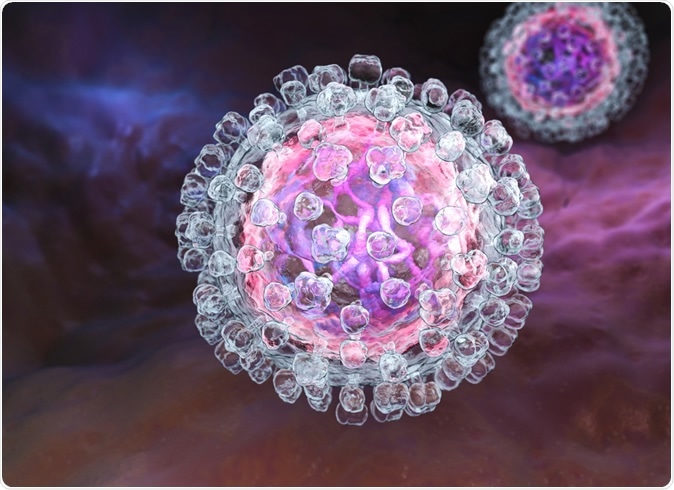Hepatitis C virus model. 3D illustration
Hepatitis C is a viral infection that affects the liver and is usually acquired from infected blood. Formerly called non-A, non-B hepatitis, this infection causes inflammation of the liver, sometimes causing serious liver damage.
Hepatitis C is one of the most common liver infections. It is caused by the hepatitis C virus (HCV). Worldwide, it affects 71 million people, and a great number of those infected will develop liver cancer or cirrhosis in the future. In fact, in 2016, an estimated 399,000 people died from hepatitis C, according to the World Health Organization. Subsequently, in the United States, there were approximately 3,000 cases of HCV.
There were fears in the past since Hepatitis C is transmitted through blood products, that those who are infected can’t donate blood or even organs. The restriction stems from the fear of transmitting the virus to uninfected and healthy individuals.
Transplanting infected kidneys to uninfected patients
Now, in the new study published in the American Journal of Transplantation, the team of researchers at the University of Tennessee Health Science Center said that the transplantation of kidneys from Hepatitis C-infected donors to uninfected recipients is safe, as shown in two smaller clinical trials and an observational study by physicians.At present, the practice of transplanting Hepatitis C-infected kidneys involves only those who are already infected with the illness. The available kidneys are more than the infected population needing kidney transplants. As a result, about 1,000 infected kidneys are discarded or thrown away every year.
The researchers aim to evaluate the safety of transplanting kidneys from HCV-infected donors. They started the study in 2018, totalling to over 80 uninfected recipients who have received their kidneys which are infected with Hepatitis C. To gain their study findings, they collected data from 53 recipients since the others are too early to evaluate properly.
The recipients all agreed to the surgical procedure, which was done in three separate steps. The researchers informed them that if they receive the infected kidney, they might be infected with the viral infection. After all, kidneys were successfully transplanted, they received a 12-week-long antiviral therapy. The good news is, no one showed any signs of infected with Hepatitis C.
“We did not lose any patients, but there were some unexpected complications," Dr Miklos Z. Molnar, associate professor of Medicine at UTHSC and transplant nephrologist at the James D. Eason Transplant Institute.
Some patients developed an infection by the BK virus, which is common after transplantation and is treatable. BK virus is a human polyomavirus that lives in the kidneys in about 90 percent of healthy people. Reactivation happens results from cellular damage or in those who had a kidney transplant.
The researchers believe that despite the complication, further research is needed. But, the important thing is, the people did not acquire the liver infection. It’s a promising finding and study since more people will benefit from a kidney transplant.
Dialysis is an alternative kidney disease treatment for those who don’t want a kidney transplant. The survival rate for people on dialysis is 50 percent in five years. About 10 percent of the patients undergoing dialysis are dying every year.
“These people would not get this offering (a transplant) without these kidneys. If you're willing to accept these kidneys, the waiting time can go down by two years,” Dr Molnar explained.
The researchers hope that the study could pave the way for the practice to become a standard in the United States.
"Otherwise, the patients would be on dialysis and die. These patients have good kidney graft function. The transplantation of Hep C-infected kidney to non-Hep C-infected recipients can be done and should be done,” Dr Molnar added.
The researchers hope more people will benefit from a kidney transplant, instead of throwing away the organs from Hepatitis C-infected people, others will benefit from them, thus, saving more lives.
Journal reference:
Molnar, M., Nair, S., Cseprekal, O., Yazawa, M., Talwar, M., Balaraman, V., Podilla, P., Mas, V., Maluf, D., Helmick, R., Campos, L., Nezakatgoo, N. Eymard, C., Horton, P., Verma, R., Jenkins, A., Handley, C., Snyder, H., Cummings, C., Agbim, U., Maliakkal, B., Sastapathy, S., & Eason, J. (2019). Transplantation of kidneys from hepatitis C–infected donors to hepatitis C–negative recipients: Single-center experience. American Journal of Transplantation. https://onlinelibrary.wiley.com/doi/abs/10.1111/ajt.15530







No comments
Post a Comment